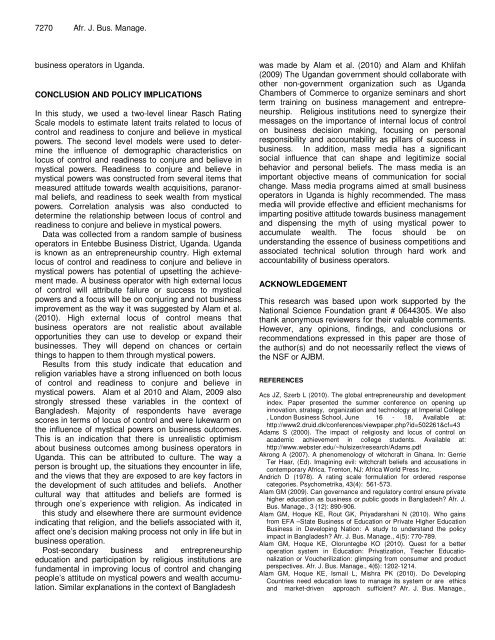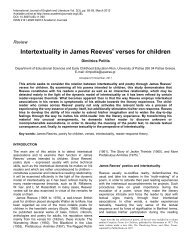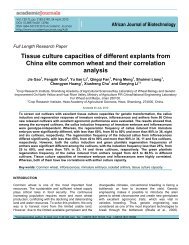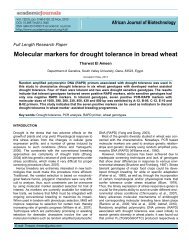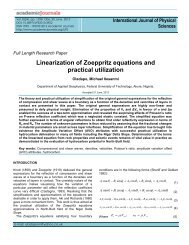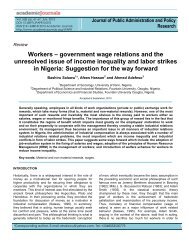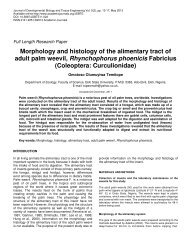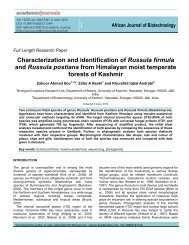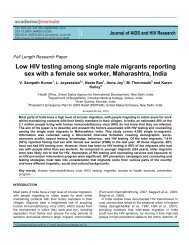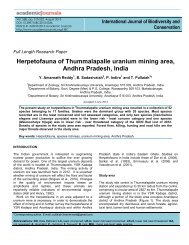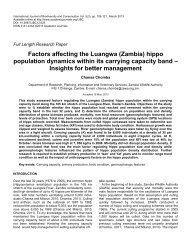Download Complete Issue (8760kb) - Academic Journals
Download Complete Issue (8760kb) - Academic Journals
Download Complete Issue (8760kb) - Academic Journals
Create successful ePaper yourself
Turn your PDF publications into a flip-book with our unique Google optimized e-Paper software.
7270 Afr. J. Bus. Manage.<br />
business operators in Uganda.<br />
CONCLUSION AND POLICY IMPLICATIONS<br />
In this study, we used a two-level linear Rasch Rating<br />
Scale models to estimate latent traits related to locus of<br />
control and readiness to conjure and believe in mystical<br />
powers. The second level models were used to determine<br />
the influence of demographic characteristics on<br />
locus of control and readiness to conjure and believe in<br />
mystical powers. Readiness to conjure and believe in<br />
mystical powers was constructed from several items that<br />
measured attitude towards wealth acquisitions, paranormal<br />
beliefs, and readiness to seek wealth from mystical<br />
powers. Correlation analysis was also conducted to<br />
determine the relationship between locus of control and<br />
readiness to conjure and believe in mystical powers.<br />
Data was collected from a random sample of business<br />
operators in Entebbe Business District, Uganda. Uganda<br />
is known as an entrepreneurship country. High external<br />
locus of control and readiness to conjure and believe in<br />
mystical powers has potential of upsetting the achievement<br />
made. A business operator with high external locus<br />
of control will attribute failure or success to mystical<br />
powers and a focus will be on conjuring and not business<br />
improvement as the way it was suggested by Alam et al.<br />
(2010). High external locus of control means that<br />
business operators are not realistic about available<br />
opportunities they can use to develop or expand their<br />
businesses. They will depend on chances or certain<br />
things to happen to them through mystical powers.<br />
Results from this study indicate that education and<br />
religion variables have a strong influenced on both locus<br />
of control and readiness to conjure and believe in<br />
mystical powers. Alam et al 2010 and Alam, 2009 also<br />
strongly stressed these variables in the context of<br />
Bangladesh. Majority of respondents have average<br />
scores in terms of locus of control and were lukewarm on<br />
the influence of mystical powers on business outcomes.<br />
This is an indication that there is unrealistic optimism<br />
about business outcomes among business operators in<br />
Uganda. This can be attributed to culture. The way a<br />
person is brought up, the situations they encounter in life,<br />
and the views that they are exposed to are key factors in<br />
the development of such attitudes and beliefs. Another<br />
cultural way that attitudes and beliefs are formed is<br />
through one’s experience with religion. As indicated in<br />
this study and elsewhere there are surmount evidence<br />
indicating that religion, and the beliefs associated with it,<br />
affect one’s decision making process not only in life but in<br />
business operation.<br />
Post-secondary business and entrepreneurship<br />
education and participation by religious institutions are<br />
fundamental in improving locus of control and changing<br />
people’s attitude on mystical powers and wealth accumulation.<br />
Similar explanations in the context of Bangladesh<br />
was made by Alam et al. (2010) and Alam and Khlifah<br />
(2009) The Ugandan government should collaborate with<br />
other non-government organization such as Uganda<br />
Chambers of Commerce to organize seminars and short<br />
term training on business management and entrepreneurship.<br />
Religious institutions need to synergize their<br />
messages on the importance of internal locus of control<br />
on business decision making, focusing on personal<br />
responsibility and accountability as pillars of success in<br />
business. In addition, mass media has a significant<br />
social influence that can shape and legitimize social<br />
behavior and personal beliefs. The mass media is an<br />
important objective means of communication for social<br />
change. Mass media programs aimed at small business<br />
operators in Uganda is highly recommended. The mass<br />
media will provide effective and efficient mechanisms for<br />
imparting positive attitude towards business management<br />
and dispensing the myth of using mystical power to<br />
accumulate wealth. The focus should be on<br />
understanding the essence of business competitions and<br />
associated technical solution through hard work and<br />
accountability of business operators.<br />
ACKNOWLEDGEMENT<br />
This research was based upon work supported by the<br />
National Science Foundation grant # 0644305. We also<br />
thank anonymous reviewers for their valuable comments.<br />
However, any opinions, findings, and conclusions or<br />
recommendations expressed in this paper are those of<br />
the author(s) and do not necessarily reflect the views of<br />
the NSF or AJBM.<br />
REFERENCES<br />
Acs JZ, Szerb L (2010). The global entrepreneurship and development<br />
index. Paper presented the summer conference on opening up<br />
innovation, strategy, organization and technology at Imperial College<br />
, London Business School, June 16 - 18, Available at:<br />
http://www2.druid.dk/conferences/viewpaper.php?id=502261&cf=43<br />
Adams S (2000). The impact of religiosity and locus of control on<br />
academic achievement in college students. Available at:<br />
http://www.webster.edu/~hulsizer/research/Adams.pdf<br />
Akrong A (2007). A phenomenology of witchcraft in Ghana. In: Gerrie<br />
Ter Haar, (Ed). Imagining evil: witchcraft beliefs and accusations in<br />
contemporary Africa. Trenton, NJ: Africa World Press Inc.<br />
Andrich D (1978). A rating scale formulation for ordered response<br />
categories. Psychometrika, 43(4): 561-573.<br />
Alam GM (2009). Can governance and regulatory control ensure private<br />
higher education as business or public goods in Bangladesh? Afr. J.<br />
Bus. Manage., 3 (12): 890-906.<br />
Alam GM, Hoque KE, Rout GK, Priyadarshani N (2010). Who gains<br />
from EFA –State Business of Education or Private Higher Education<br />
Business in Developing Nation: A study to understand the policy<br />
impact in Bangladesh? Afr. J. Bus. Manage., 4(5): 770-789.<br />
Alam GM, Hoque KE, Oloruntegbe KO (2010). Quest for a better<br />
operation system in Education: Privatization, Teacher Educationalization<br />
or Voucherilization: glimpsing from consumer and product<br />
perspectives. Afr. J. Bus. Manage., 4(6): 1202-1214.<br />
Alam GM, Hoque KE, Ismail L, Mishra PK (2010). Do Developing<br />
Countries need education laws to manage its system or are ethics<br />
and market-driven approach sufficient? Afr. J. Bus. Manage.,


